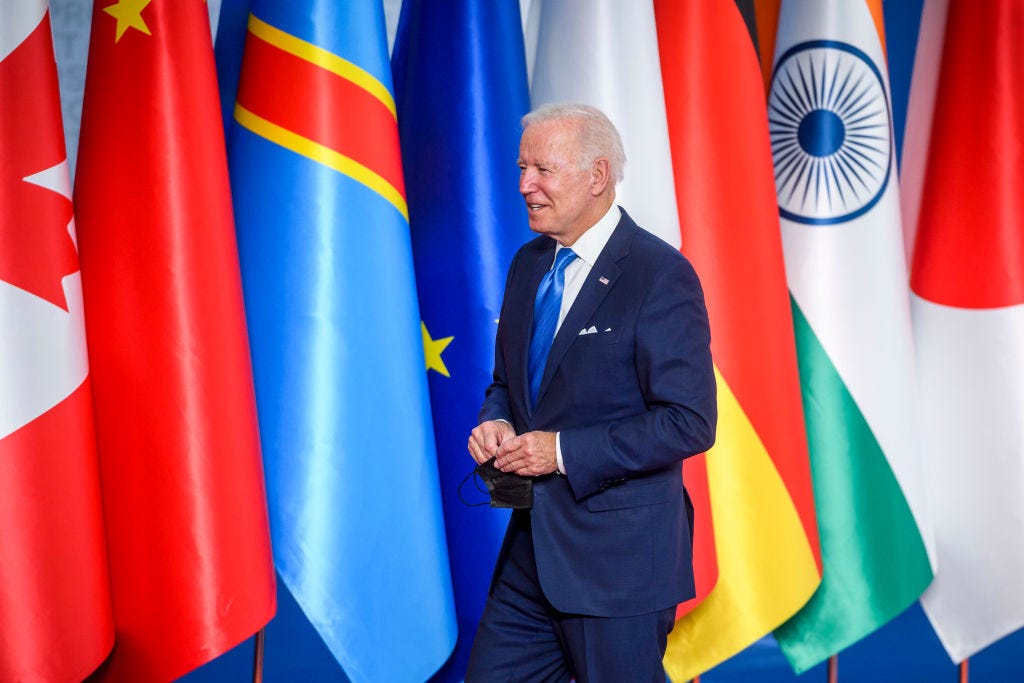The Way Forward: Cooperation, Not Isolation
The G20 and COP26 conferences promise a renewed commitment to global action

President Joe Biden will spend the next few days in Glasgow at COP26 discussing climate change and the role that the US and other nations can play in mitigating this crisis. Much of the talk will focus on the variety of ways to cut carbon and methane emissions and limit the planet’s warming to 1.5 degrees Celsius above pre-industrial levels—a policy agenda that governments must prioritize.
Last week Biden admitted privately that he’s skeptical that top polluters will do more than make promises and worries that the system for assessing real progress is not reliable. Countries can set their own terms and measures to demonstrate goals and outcomes. But the need for optimism and action—and the recognition that this is an opportunity to rethink and reset the systems and values that define modern life—could not be clearer.
At the just-concluded G20 conference in Rome, the world leaders’ complicated closing statement illustrates both the renewed cooperation among all the participants and the precarious path to achieving necessary change.
“Keeping 1.5°C within reach will require meaningful and effective actions and commitment by all countries, taking into account different approaches, through the development of clear national pathways that align long-term ambition with short- and medium-term goals, and with international cooperation and support, including finance and technology, sustainable and responsible consumption and production as critical enablers, in the context of sustainable development.”
Yes, cooperation among nations, especially when it requires real, disruptive change and sacrifice, is never easy. But—given the rise of CO2 levels and the impact that’s having on the planet and humans and other species—it could not be more obvious how crucial collaborative effort is. As the UN’s latest IPCC report asserted in August, “unless there are immediate, rapid and large-scale reductions in greenhouse gas emissions, limiting warming to close to 1.5°C or even 2°C will be beyond reach.”
That cannot be achieved by nations acting alone or, worse, acting as if the reality of the problem does not exist. We’ve seen that play out to great misfortune during the GOP-led Trump years. But the combination of nationalistic, isolationist, refugee-bashing rule was not just an American phenomenon. We saw it in the UK, where it led to Brexit. And we’ve seen the rise of virulent strains of right-wing nationalism throughout Europe and Asia.
And yet: The climate and environmental challenges could not offer clearer evidence that these are regional and global challenges, not merely national ones. Hurricanes and heat waves don’t stop at borders. Nor do wildfires, droughts or floods.
And even while the US and other nations rely on their borders and immigration polices to restrict entry, climate-induced dislocation and growing populations of refugees forced from their home countries is both on the rise and certain to grow dramatically. One international think tank predicts that, by 2050, some 1.2 billion people will face dislocation, with more vulnerable and conflict-ridden developing nations most at risk.
This too is not simply a national problem, resolved by building walls and demonizing the dislocated.
So count me in for global cooperation. Much of what you hear from Scotland in the coming days may just sound like politicians and bureaucrats hemming and hawing and releasing their own gassy emissions. But don’t doubt that they are engaged in serious business, arguably the most serious business on and for the planet.
Let’s hope for their success. Life itself depends on it.
One other note: If you haven’t seen the newly published Washington Post investigation—before, during and after January 6—do check it out. As the writers of the three-part series summarize, “the insurrection was not a spontaneous act nor an isolated event. It was a battle in a broader war over the truth and over the future of American democracy.” Despite myriad red flags, most remained unheeded.
Among the deeply reported findings, based on the work of 75 journalists:
Law enforcement officials did not respond with urgency to a cascade of warnings about violence on Jan. 6.
Trump’s election lies radicalized his supporters in real time.
Escalating danger signs were in full view hours before the Capitol attack but did not trigger a stepped-up security response.
Trump had direct warnings of the risks but stood by for 187 minutes before telling his supporters to go home.
His allies pressured Pence to reject the election results even after the Capitol siege.
Republican efforts to undermine the 2020 election restarted immediately after the Capitol attack.
Trump’s attacks have led to escalating threats of violence nationwide.
I usually try not to amplify Trump’s gaslighting, but I think his response to this investigation is worth noting. The Post reported receiving a “lengthy written response that included series of unrelated, inflammatory claims,” and they did not plan to publish it. But they did report that he “greatly objected” to all of the investigation’s findings, calling it “fake news” and falsely claiming the Capitol attackers as “agitators not associated with President Trump.”
When it comes to this man, there is no lie too brazen, no bottom to be found.
Support the mission of America, America? Find value in these dispatches? A gentle reminder that you can sustain this work with paid subscriptions.


I will forever despise TFG for what he has done to our nation. I am planning on reading the Washington Post piece today, too. Thank you, Steven, for your valuable insight.
I read it. Amazing work.